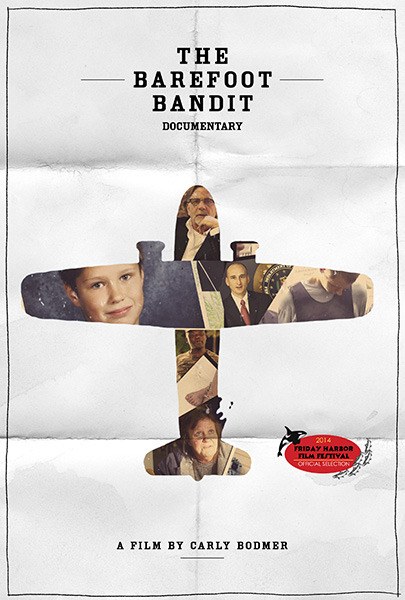Carly Bodmer wanted answers.
Why would a teenager steal a plane and fly it without any training? Why would a young man break into strangers’ homes, steal from small businesses and live in the woods for long stretches of time? Why would he become a symbol of rising up against authority, why would he be called a folk hero by some and a criminal by others?
After three years of work and numerous interviews, Bodmer thinks her film answers these questions. But you may have to wait until the last scene in the documentary to get it.
“I was trying to make sense of the story,” said Bodmer. “I wanted more tangible answers to the ‘whys.’ I think I successfully answer the why.”
You can find out for yourself at the screening of “The Barefoot Bandit Documentary” at the Sea View Theater on Thursday, Jan. 15 at 7:30 p.m. The film was originally shown at the Friday Harbor film festival and then at a Bahama film festival, creating a parallel with Harris-Moore’s own journey starting with theft in the San Juans and ending with his arrest in the Caribbean. The documentary also had screenings in Olympia, Stanwood, Mt. Vernon, Portland and Anacortes.
The film follows the life and capture of Northwest native Colton Harris-Moore after his two-year international crime spree. The young man was dubbed the “Barefoot Bandit” because of his lack of footwear during break-ins. Delving into this young man’s past, Bodmer finds some answers in family dynamics, especially through interviews with Harris-Moore’s mother Pam, who Bodmer describes as complicated.

She also tells the story of Harris-Moore’s life through Colton’s captor, lawyer and the FBI team that hunted him for two years, as well as others involved in the crime spree.
Bodmer’s only regret about the film is the absence of Harris-Moore, who could not be interviewed due to a movie deal he made with 20th Century Fox in 2011, worth up to $1.3 million. He will put the money toward the $1.4 million he owes as restitution to victims of his two-year crime spree.
Bodmer said she wishes that she had his perspective, but she feels like the documentary paints an accurate portrait of the young criminal despite his absence.
This is Bodmer’s first documentary and her second film she has produced. She was originally inspired by Facebook posts of her friends about the “Barefoot Bandit.”
“It was the most insane thing I had ever heard,” said Bodmer, who is a New York native but spent three years in Seattle.
She hopes that island audiences will not see the documentary as a glorification of the bandit’s exploits, but that people will glean their own truths.
“I want people to judge it themselves. It [the documentary] is a much bigger picture piece of the story,” said Bodmer, comparing her work to what the mass media has already presented.
After working on this project Bodmer sees Harris-Moore not as a folk hero or a criminal but as a capitalist.
She describes him as wanting to be Bill Gates rather than a folk hero who is a champion for the poor, but he did accomplish remarkable things.
With what she calls an undeniable intelligence and a desire for near-suicidal escapism due to his stealing and flying of planes without any training, Bodmer sees Harris-Moore as an extremist with the demons of a rocky childhood propelling him farther into chaos.
“I think the reason why people are attaching the term ‘folk hero’ to him is because there is that sense of evading authority, that he is above the law. That is a real American tradition … like Jesse James,” she said. “We love these characters because we all kind of have these things that limit us.”
Bodmer is also aware that on the islands many people see Harris-Moore as someone who attacked small business owners and homeowners rather than someone who is a symbol for heroism.
She said she does not want to celebrate his legend as much as reveal what can happen to youths in our community if they are not well cared for.
In the end, the documentary focuses on the child that Harris-Moore is. That is why Bodmer animated many of his early childhood drawings of planes to show that stealing planes may be more than just an act of defiance, but rather a way to deal with other troubling factors in his life.
“Flight was his escapism, his way to survive,” she said.


